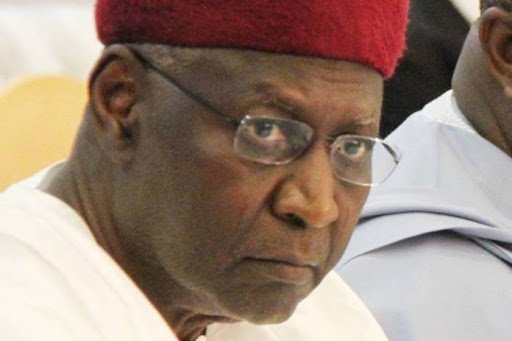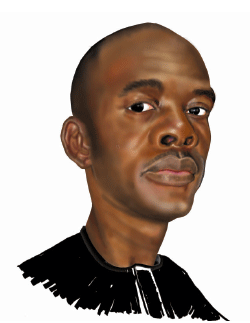By Ikechukwu Amaechi

When the tributes, most of them effusive, started pouring in on Saturday, April 18, for President Muhammadu Buhari’s late chief of staff, Mallam Abba Kyari, I was nonplussed.
Here was a man perceived as a public enemy and held responsible for whatever was wrong with the Buhari presidency while alive suddenly being beatified in death. I had no personal relationship with Kyari. In the five years of Buhari’s tenancy in Aso Rock, I have been a persona non grata and not even once have I been invited to any function of the presidency.
But as I usually do when confronted with a knotty political riddle, I reached out to a friend, who has been a reliable source in all my years in journalism, to help me untie the knots. A high profile political actor, who I often accuse of being part of the “deep state” in Nigeria, he has never failed me.
Before Kyari’s death, when the rumour mill was agog that President Buhari had contracted the deadly coronavirus probably from his chief of staff and secretly flown abroad for treatment, I sent him a text: “Do you have any information on the whereabouts of President Buhari and his possible coronavirus status?”
His response was emphatic. “Editor, the man is in the Villa and he does not have coronavirus, He is taking the same precautionary measures everyone is taking.”
So, I went back to him to help me unravel the Kyari mystery. Was there more to the man than Nigerians knew? Who was Abba Kyari?
I had no idea when I set out on this discovery mission that my friend had any relationship with Kyari because his name never came up in any of our discussions.
Did Abba Kyari actually live a life of service to others, I asked. Was he really a good man whose actions and even inactions rubbed off positively on the country? Did he mean well for Nigeria?
He answered the three questions separately:
- Did Abba live a life of service to others? The danger with blind loyalty is that it is often difficult for people to see anything good in your actions if you are serving an inherently bad person. Abba was a victim of blind loyalty.
- Was he really a good man whose actions and even inactions rubbed off positively on the country? Abba was a left leaning ideological person. He loathed capitalism and capitalist approach to governance and economy. To that extent, his worldview aligned with that of his boss and he was not ready for alternative views. In that respect, he did everything he had to do in the service of his boss. But he wrongly interpreted/equated that to serving his country.
- Did he mean well for Nigeria? Yes he did to the best of his understanding and comprehension. What the people believe or feel is different.
I told him that I had no reason to doubt the character witness he had just given. But I also reminded him that Kyari was by far more educated, more cerebral, better exposed than his principal and was widely believed to be Buhari’s brain box; the power behind the throne.
To that extent, therefore, I argued that rather than being a victim of blind loyalty, Kyari may actually be a villain who took advantage of the manifest handicaps of his principal and manipulated his narcissistic tendencies for narrow political gains.
I told my friend that if Kyari was such a positive influence, he should have been able to moderate the very toxic policies of a government in which he wielded enormous powers. He agreed that the late chief of staff could be vicariously liable but insisted that Buhari should be held solely responsible for the ills of his regime.
“If you knew Abba, you will understand what I am talking about. The man just couldn’t do anything against the wishes of his boss even if he feels otherwise. Take this to the bank, he never did anything without the clearance or directive of the president. The man did nothing that Buhari didn’t ask him to do. He never did anything without the president’s say so or approval.
“Go back to Buhari’s military record as head of state and you will agree that his actions today are not different from his actions then. Was Abba with him then? A leopard never changes his skin. Buhari has always been an ethnic bigot.
“The problem with many Buhari loyalists is that they are all too scared to tell him how the people feel and I warned Abba of a time like this. Of course, I wasn’t thinking about death but a possible exit from power and I also told him how much people hated him outside.
“The truth is that Buhari is just inherently wicked but Abba was ready to take the bullet for him and he finally did.”
We left it at that. Both in life and now in death, Kyari remains a highly controversial and divisive figure. There are Nigerians who had very personal relationship with him. To such people, his death is a personal loss. Here, Minister of Foreign Affairs, Geoffrey Onyeama, stands out with his heartfelt tribute to celebrate a 43-year-old friendship.
But anyone who could read between the lines will notice that most of the other tributes were from people who were only trying to be politically correct. Even in death, they perceived that Kyari still wielded a lot of influence and, therefore, played safe by commiserating with the president.
Yet, ordinary and not so ordinary Nigerians who held the wrong end of the Buhari governance stick and blamed Kyari, rightly or wrongly, for their misfortune didn’t care a hoot. In fact many celebrated his death.
In all these, I find Iyorwuese Hagher’s “Midnight for Abba Kyari, midnight hour for Nigeria” tribute most apt.
Hagher, former minister who now resides in Ohio, U.S., said he did not know Kyari well and apparently had no relationship with him but was scandalised by the “senseless gloating over the demise of one of us for whom the bell has tolled.”
I agree. It is distasteful to rejoice over the death of anyone because as John Donne, the 17th century English scholar and poet, wrote, “Any man’s death diminishes me, because I am involved in mankind, and therefore never send to know for whom the bells tolls; it tolls for thee.”
Hagher insists that Kyari is dead and is best left with his maker who will give him a just recompense for his service on earth.
Again, I agree but to an extent. Leaving him with his maker does not mean we should not talk about his stewardship while he was here with us.
I disagree with those who insist that he was the best thing that happened to public service in Nigeria as most of the tributes seem to suggest.
As many have pointed out, Kyari was hated and in most cases viscerally. And he knew it. But surprisingly that didn’t bother him.
And I ask, shouldn’t leaders be bothered about what the people think? The fact that Kyari didn’t care a hoot about public perception is a proof of how contemptuously he held all of us. That smacks of arrogance of power.
I disagree with Hagher’s assertion that the next chief of staff will also be hated because “hatred comes with the job description of the office he occupied.” It is grossly hyperbolic to assert that “if you are chief of staff to the president or a governor and do not want to be hated, then you do not know your job.”
Kyari was not the first chief of staff in Nigeria. He is unlikely to be the last. He was not hated because of the position he occupied. He was hated because of the actions he took while in that position which many considered deleterious to Nigeria and Nigerians.
He may have acted out the script of his principal as widely claimed. But that does not exonerate him. It has been widely acknowledged that Kyari was an exceptionally brilliant mind who understood the nuances of power and wielded it with ruthless efficiency.
But to interpret loyalty, as brilliant as he was, so narrowly was a disservice to Nigeria.
A patriot must balance loyalty to his principal and fatherland because any loyalty that detracts from the building of a truly inclusive Nigeria is a recipe for disaster.
Was Kyari responsible for the ills of the Buhari administration? Was he to blame for everything that has gone wrong in the country in the last five years? No! We still have a president who claims to be on top of his game.
Was he a victim of blind loyalty? Maybe! But he had only himself to blame. That was the path he consciously chose to tread in the corridors of power
Is it true that an appointee can only be as powerful as the president wants him or her to be? Yes, that is in the nature of power. But Abba Kyari cannot be exonerated from his apparent misuse of power on account of that.
Will Nigeria’s problems go away now that he is dead? No, because as long as Buhari remains who he is, nothing will change for the better.













